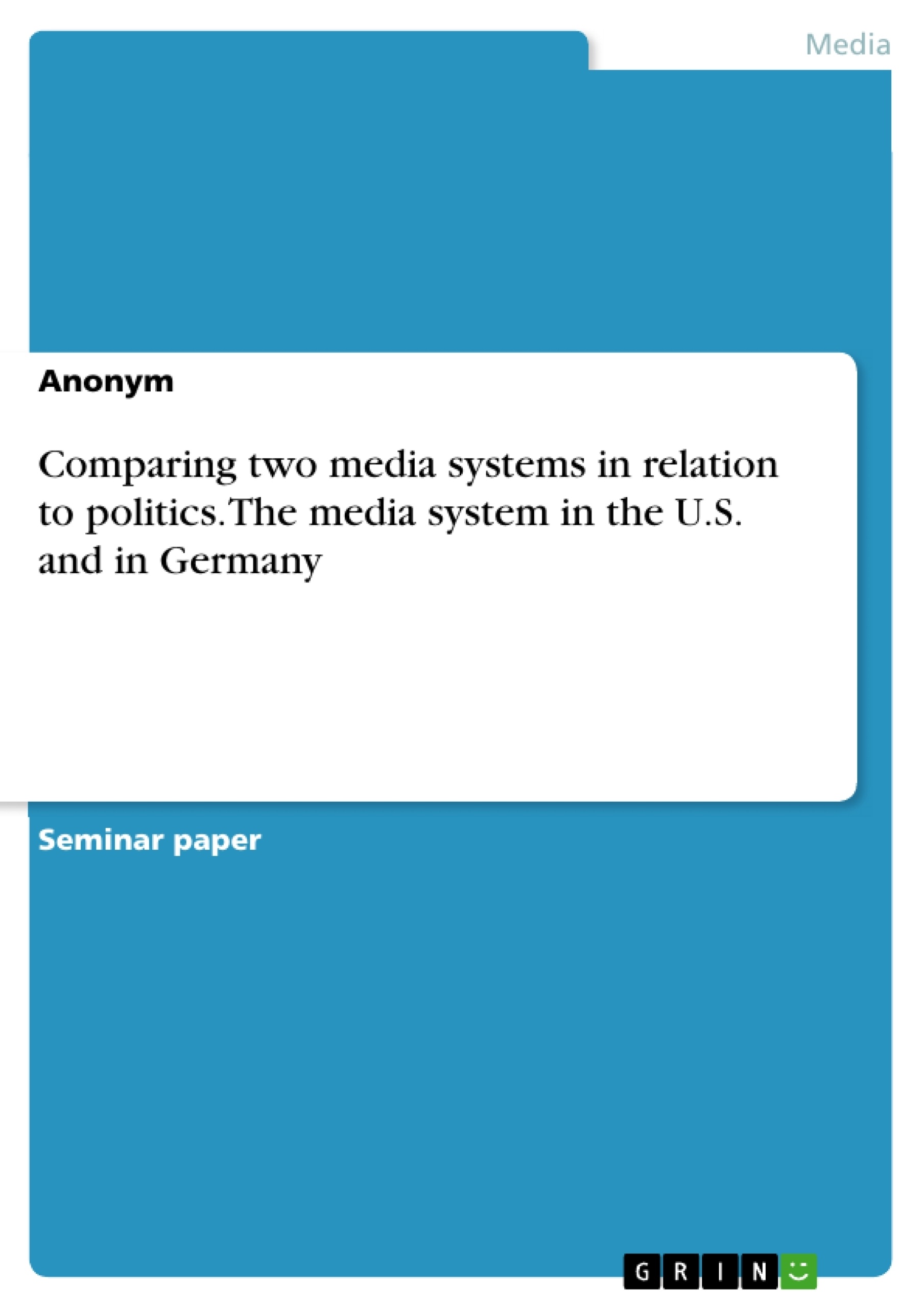The purpose of this paper is to discuss the media system of the U.S. and the media system of Germany. In the following, the two media systems are compared in terms of ownership, number, role and regulation. Furthermore, in this paper the link between media and politics will be examined. The last part consists of deducing, which media system serves its citizens best. In the scope of this work it will not be possible to take a look at all forms of media, so this paper will focus on TV.
By looking at different countries it becomes clear that every state has its own media system with specific functions, structures and developments. Of course it can be argued, due to the interdependence of the world economy and the European integration that more and more a process of homogenization manifests. But in a media system cultural and political peculiarities still remain. This work serves to point out the similarities and the differences of two different media systems and aims to allude to the interrelations in regard to politics.
Inhaltsverzeichnis (Table of Contents)
- Introduction
- Comparison of two media systems in relation to politics
- TV-ownership
- Numbers
- The Role of television
- Regulations
- Consolidation
- Media and politics linked
- Conclusion
- Sources
Zielsetzung und Themenschwerpunkte (Objectives and Key Themes)
This paper aims to compare the media systems of the United States and Germany, focusing on television. It examines the similarities and differences in ownership, number of channels, role of television, and regulatory frameworks. The paper also explores the relationship between media and politics in both countries.
- Comparison of media systems in the US and Germany
- Role of television in shaping political opinion
- Regulation of broadcast media in both countries
- Impact of media ownership on content
- Relationship between media and politics
Zusammenfassung der Kapitel (Chapter Summaries)
Introduction
The introduction outlines the purpose of the paper, which is to compare the media systems of the US and Germany, focusing on television. It highlights the cultural and political peculiarities that distinguish these systems despite globalization and homogenization trends.
Comparison of two media systems in relation to politics
TV-ownership
This section describes the development of television ownership in Germany and the US. In Germany, public broadcasting dominated initially, followed by the emergence of private commercial channels. The US experienced a faster adoption of television, with commercial television established early on. The section also discusses the concentration of ownership in both countries and its potential implications for news bias.
Numbers
This section presents data on the number of TV channels available in Germany and the US, as well as viewing habits in both countries. The influence of television on political opinion-making is also highlighted.
The Role of television
This section explores the role of television in shaping political discourse and opinion. It examines how television's visual aspect has influenced political communication and the impact of televised debates on elections. The section also discusses the importance of local news in both countries.
Regulations
This section examines the regulatory frameworks for broadcast media in Germany and the US. It compares the roles of the German State Media Authorities and the US Federal Communications Commission (FCC) in licensing, frequency allocation, and content control.
Schlüsselwörter (Keywords)
This paper focuses on the media systems of the US and Germany, specifically examining television ownership, regulation, and the relationship between media and politics. Key concepts include public and private broadcasting, media consolidation, political communication, and the role of television in shaping public opinion.
Frequently Asked Questions
How do the media systems of the US and Germany differ in TV ownership?
Germany has a strong tradition of public broadcasting alongside private channels, while the US media landscape is predominantly commercial and private, with a faster early adoption of television.
What is the role of the FCC in the United States?
The Federal Communications Commission (FCC) regulates interstate and international communications by radio, television, wire, satellite, and cable in the US, including licensing and content guidelines.
How is broadcast media regulated in Germany?
In Germany, regulation is largely the responsibility of the State Media Authorities (Landesmedienanstalten), which handle licensing and ensure compliance with legal standards for private broadcasters.
How does media ownership affect political discourse?
The paper examines how consolidation and ownership concentration in both countries can lead to potential news bias and influence the shaping of political public opinion.
Which system is argued to serve its citizens best?
The conclusion of the paper deduces which system—the US commercial model or the German dual model—better fulfills the informational needs and democratic requirements of its citizens.
- Quote paper
- Anonym (Author), 2013, Comparing two media systems in relation to politics. The media system in the U.S. and in Germany, Munich, GRIN Verlag, https://www.grin.com/document/318761



